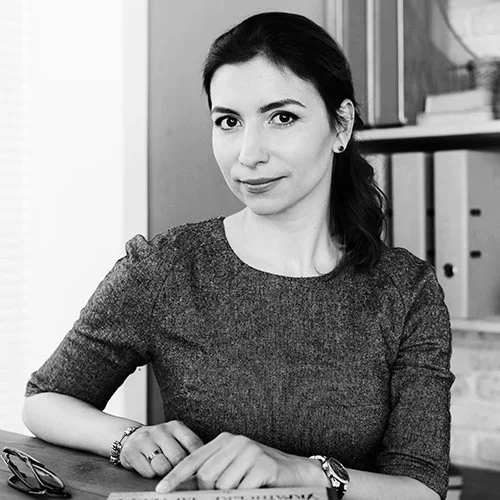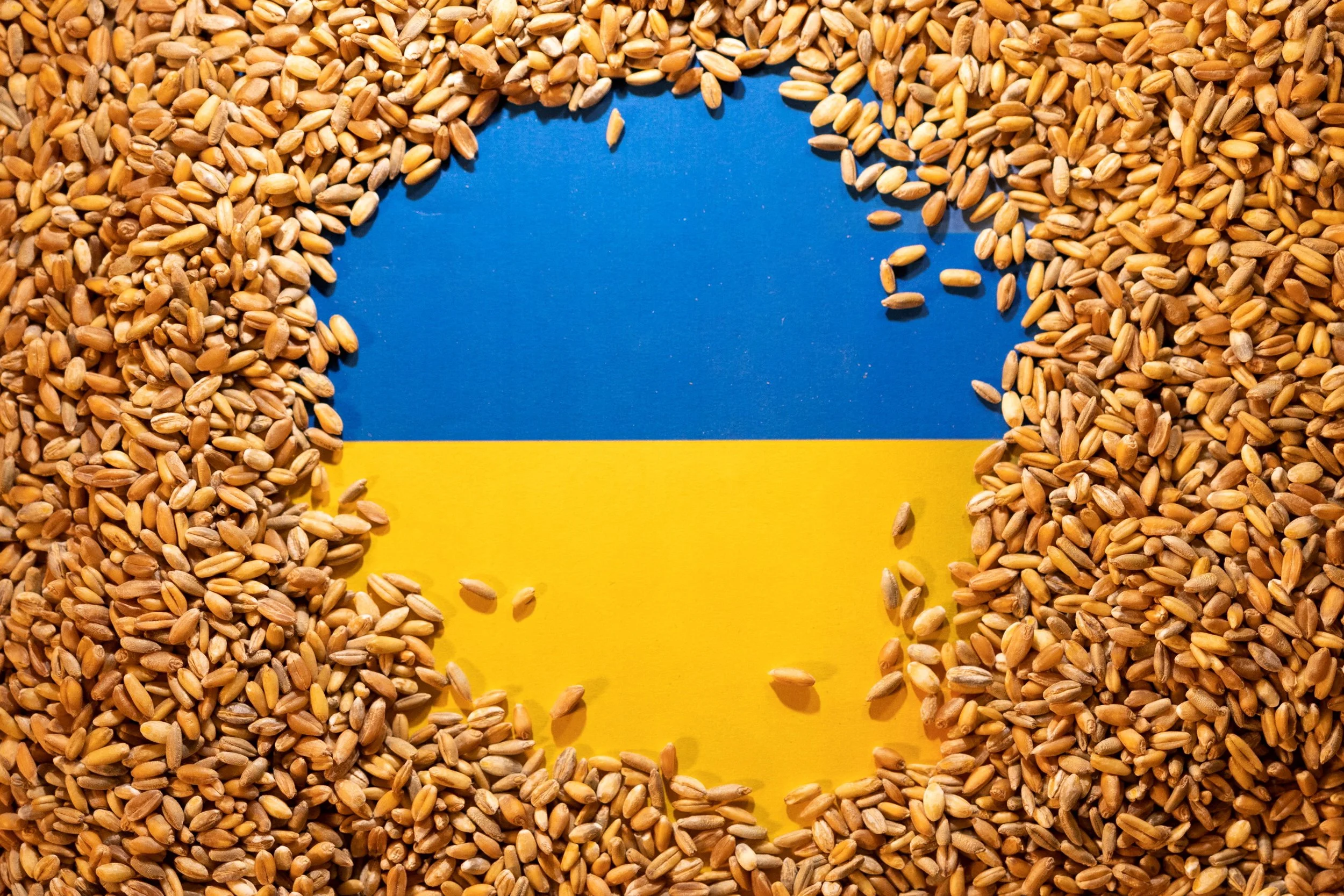A year after Russia’s invasion of Ukraine, over 8 million Ukrainian refugees have been registered across Europe. According to UNHCR, the vast majority of civilians who have fled the war are women over 35 with one or more children. Men aged between 18-60 are not permitted to leave (except under special circumstances).
This week, instead of the regular fashion angles, I’m bringing you this very personal conversation with Olena Braichenko, a Ukrainian refugee who, with her six-year-old daughter, is currently staying with my best friends in London. When I go to visit them, they joke that I never want to leave. How must it feel when you can’t?
Finding refuge in a new country is obviously a wonderful thing - and we acknowledge the many millions who aren’t so lucky - but what’s it like to try to make your way somewhere far from home, with strangers? To have to learn a new language? When your husband, parents and many of your friends are back home, and you’re watching the war on the news? When your life, as Olena puts it, feels “on pause”?
This is also a story about sustainability and food culture, Ukraine’s famous černozëm black soil, long traditions of foraging, pickling, small family farms and growing your own veggies.
Olena is a food writer, publisher and academic, who with her husband, Artem, founded Yizhakultura – a project dedicated to Ukrainian cuisine, where scholars, chefs, food critics, and food anthropologists discuss its history, culture and heritage. She believes in the power of culinary diplomacy, to help get beyond the single story. War is devastating, but people, she reminds us, are more than their experiences of displacement. “I am firmly convinced that everyone who has survived occupation needs to be seen not as a victim, but first and foremost as a person.”
Listen to Episode 159 with Vogue Ukraine fashion editor Venya Brykalin here.
Ukraine. Food and History
“Wonderfully illustrated coffee table edition which includes Ukrainian traditional recipes and exciting stories about the history of Ukrainian cuisine. This book tells the story of Ukrainian cuisine by placing it in its cultural context and presenting Ukrainian cooking as part of the intangible cultural heritage of Ukraine. The publication also explores the potential of cultural diplomacy and includes recipes that will make you fall in love with Ukraine.” Buy the book on Amazon
Photo from Ukraine: Food & History
NOTES
BORSCHT “Ukraine's culture of cooking borsch, the hearty soup with beets and cabbage, has made it to UNESCO's list of heritage traditions "in need of urgent safeguarding" because of Russia's invasion. Often written borscht in English, the soup is widely eaten across Eastern Europe and is extremely common in Russia. But Ukraine considers it a national dish, or as UNESCO put it: "part of the fabric of Ukrainian society, cultural heritage, identity and tradition." Via NPR.
In its decision, the Intergovernmental Committee’s noted that armed conflict has threatened its viability: “The displacement of people and bearers threatens the element, as people are unable not only to cook or grow local vegetables for borscht, but also to come together to practice the element, which undermines the social and cultural well-being of communities.”
The culture of borscht cooking has long been practiced and celebrated in all regions of Ukraine, with communities, families and restaurants developing their own versions of this traditional and popular dish, which is based on beetroot. It reflects local characteristics and products depending on the region. Variations of borscht can include mushrooms, fish or sweet peppers. Whether as part of a wedding meal, the focus of food-related competitions or as a driver of tourism, borscht is considered part of the fabric of Ukrainian society, cultural heritage, identity and tradition.
WHAT IS CULINARY DIPLOMACY? “Culinary diplomacy is the use of food as a tool that fosters cultural understanding among countries … Food is an ambassador in and of itself. Historically, food has been used for peace-building even though it has only recently become popular in public diplomacy. The Romans would use food as a way to create peace with their enemies - by sharing a meal together, people become more open to each other and this starts the creation of a diplomatic bond.” Via Spoon University
Creator: DADO RUVIC | Credit: REUTERS
GRAIN Ukraine is a major global exporter of sunflower, maize, wheat and barley. When Russia invaded in February 2022, its naval vessels blockaded Ukraine's ports, trapping some 20 million tonnes of grain.
Ukraine’s rich black SOIL makes it one of the most fertile places on Earth. It's a soil that was formed from very fine mineral particles that prehistoric winds carried away from ancient glacial beds. “The secret of fertility is called černozëm, a humus-rich black soil that covers more than 65 percent of the country’s arable land…This particular soil has attracted the attention of scientists since the 19th century. In a paper published in 1866, Austrian scientist Franz Joseph Ruprecht first revealed that its organic matter consisted of decomposed steppe grasses. Black soil is present on 1.8% of the planet’s land surface. The highest concentrations are found in Eastern Europe, in North American prairies, in Argentina and in Asian steppes. Almost a quarter of the global černozëm is located in Ukraine.” Read the rest on Resoilfoundation.org
CHERRIES A quarter of all Ukrainian sweet cherries are grown in the Zaporizhia region, with more than half of local cherry orchards located in Melitopol District. Melitopol was one of the first Ukrainian cities to fall into Russian hands after the invasion in 2022. Read more here.
Via Green Ukraine
BERRIES & MUSHROOMS In the Ukrainian Carpathian mountains, wild berries abound. “Mushroom season in the Carpathian mountains begins in the middle of July. The most common mushrooms of that time are the chanterelles, easily spotted thanks to their bright orange color.” But “the commonly accepted favorite is surely the white mushroom (Boletus edulis), or ‘borovyk’, that is considered to be the most valuable” of all. Via Green Ukraine. Read the rest here.
A Russian missile slammed into this farm north of Ukraine’s capital, Kyiv, last month.Credit...Ivor Prickett for The New York Times
RESISTANCE When asked why her family and friends continue to forage for mushrooms in the forests, despite knowing that Russian landmines could be lurking there: “We feel it’s our land. I don’t want to be afraid to walk on my land. So, yes, I will pick the mushrooms,” says Olena.
DESTRUCTION According to OECD: “The environment, natural resource base and infrastructure have not been spared by the war. The shelling of forests, land and marine ecosystems, industrial facilities, transport infrastructure and houses, as well as water, sanitation and waste management infrastructure, has caused widespread and severe damage, with immediate and longer-term consequences for human health and eco-systems.”
USSR During the period of its existence, the Union of Soviet Socialist Republics was by area the world’s largest country. It was also one of the most diverse, with more than 100 distinct nationalities living within its borders. The majority of the population, however, was made up of East Slavs (Russians, Ukrainians, and Belorussians); these groups together made up more than two-thirds of the total population in the late 1980s. Via Encyclopaedia Britannica. In 1991, at the beginning of the end of the Soviet Union, Ukraine declared independence after nearly 70 years under Moscow's control.
MCDONALD’S The first Maccas opened in the Soviet Union 1990. Even though a meal cost half a day's salary, hundreds lined up in Moscow for the American burgers. Read more here. For many, when the fast food chain pulled out of Ukraine in February 2022, it felt symbolic. Like a rolling back of freedoms, whether or not you’re into Big Macs. Its re-opening in August 2022 was welcomed.
Better eat this though, if you’ve got the choice!
Enjoying the show? Please help us spread the word by sharing it with a friend, and following, rating and reviewing in your fave podcast app. Got feedback? Tell us what you think! Find Clare on Instagram and Twitter @mrspress
THANK YOU FOR LISTENING!











